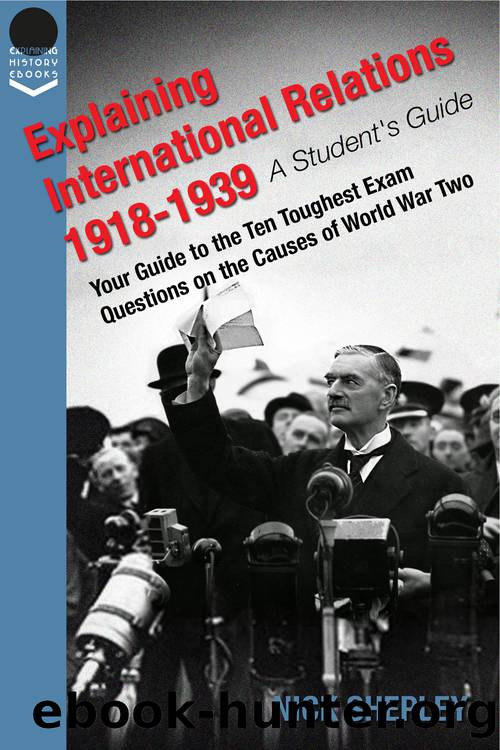Explaining International Relations 1918-1939 by Shepley Nick;

Author:Shepley, Nick;
Language: eng
Format: epub
Tags: Hitler, Stalin, Chamberlain, Daladier, Mussolini, appeasement, WW2, WWII, world war, world at war
ISBN: 4681460
Publisher: Andrews UK Ltd.
Published: 2016-03-07T00:00:00+00:00
Question 7
How did the Spanish Civil War affect international relations?
Between 1936 and 1939, Spain descended into anarchy, bloodshed and violence on an enormous scale, as right wing nationalist generals sought to overthrow the Spanish Republic, created in 1931. The civil war involved nearly every other major European power and some commentators saw it as the first steps towards a new European war. In the five years since a reformist government had taken control and ousted Spainâs monarchy, reforms designed to alleviate the grinding poverty experienced by Spainâs poor were fiercely resisted by the ruling classes, comprised of the army and the land owners (Latifunda). The return of a right wing government in 1933 was met with mass protest and an uprising on the left was violently suppressed by the army, led by General Francisco Franco in 1934. When in 1936 a broad popular front of socialist parties won the general election, the army decided to rebel and launched its war to overthrow the republic in July 1936. The struggle in Spain seemed to show an increasingly ideologically polarised Europe and even though 27 countries signed a non intervention pact in September that year, the USSR was the first to break it by supplying arms to the republic, but this was quickly followed by support for the nationalist generals from Fascist Italy and Nazi Germany. Italy eventually committed a total of 75,000 men to fight alongside Francoâs forces and the German Condor Legion was a force 12,500 strong. Both Germany and Italy sent tanks, motorised troop carriers and aircraft to fight in Spain and both powers were pivotal in turning the tide of war against the republic.
The non intervention pact meant that arms would be embargoed to both sides in the civil war but the British, whoâs navy was one of the most important devices for enforcing the embargo, were selective over which ships were stopped. Arms shipments from the USSR were blocked by the signatories of the non intervention pact, but German and Italian shipments of aircraft, tanks and men were ignored. Franceâs socialist prime minister Leon Blum had initially promised arms to the republican government but British prime minister Stanley Baldwin put pressure on him to abandon these plans. The USSR knew it was neither diplomatically or militarily powerful enough to directly intervene with troops, even though strategically, maintaining a friendly government in Spain would have been a significant advantage to Stalin. In any event Stalin was prepared for the Republic to fall if necessary, just as long as he could ensure that Hitler became bogged down in a long and intractable conflict in Spain which would sap Germanyâs resources and give Stalin time to prepare for war. Comintern, the party organ that regulated stalinist parties across Europe and beyond sent out orders for brigades of volunteers from America and Europe to come to Spain and fight for the Republic. From Britain, a total of 2,500 men, mainly organised and led by the Communist Party of Great Britain travelled
Download
This site does not store any files on its server. We only index and link to content provided by other sites. Please contact the content providers to delete copyright contents if any and email us, we'll remove relevant links or contents immediately.
The Vikings: Conquering England, France, and Ireland by Wernick Robert(84229)
Ali Pasha, Lion of Ioannina by Eugenia Russell & Eugenia Russell(40256)
The Conquerors (The Winning of America Series Book 3) by Eckert Allan W(37473)
The Vikings: Discoverers of a New World by Wernick Robert(36978)
Cecilia; Or, Memoirs of an Heiress — Volume 1 by Fanny Burney(32558)
Cecilia; Or, Memoirs of an Heiress — Volume 2 by Fanny Burney(31956)
Cecilia; Or, Memoirs of an Heiress — Volume 3 by Fanny Burney(31942)
Empire of the Sikhs by Patwant Singh(23086)
The Secret History by Donna Tartt(19088)
Hans Sturm: A Soldier's Odyssey on the Eastern Front by Gordon Williamson(18591)
Cat's cradle by Kurt Vonnegut(15355)
Pimp by Iceberg Slim(14507)
Sapiens: A Brief History of Humankind by Yuval Noah Harari(14389)
Talking to Strangers by Malcolm Gladwell(13370)
Norse Mythology by Gaiman Neil(13365)
Leonardo da Vinci by Walter Isaacson(13336)
4 3 2 1: A Novel by Paul Auster(12392)
Underground: A Human History of the Worlds Beneath Our Feet by Will Hunt(12098)
The Radium Girls by Kate Moore(12028)
